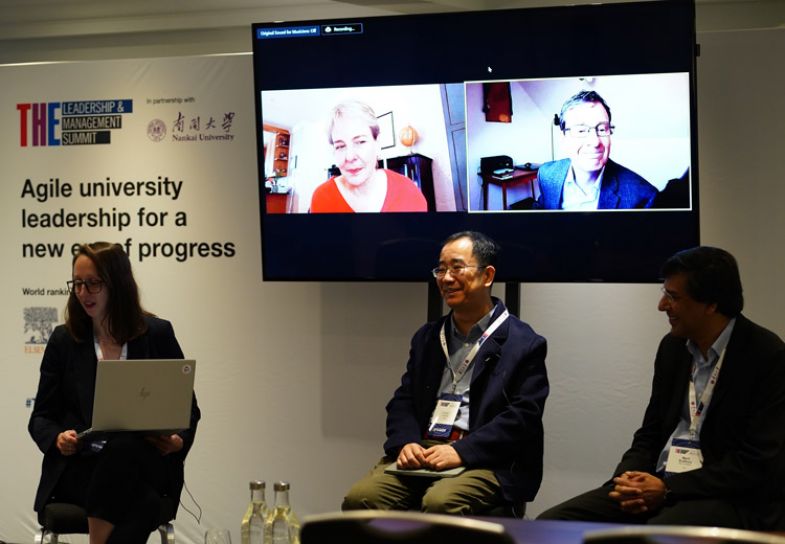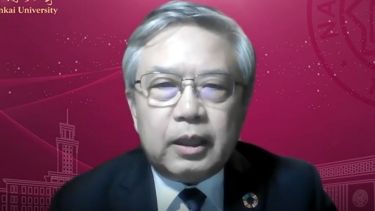
As universities are asked to shape their research priorities to deliver meaningful impact, institutional leaders need to show the skills to support and inspire researchers
Higher education leaders must communicate effectively internally and with partners in other industries and be willing to take the risks and long-term approach needed for transformative research.
At a session during the 2022 THE Leadership and Management Summit, held in partnership with Nankai University, a panel of academic and industry experts discussed the importance of leaders in shaping research priorities.
Heide Hackmann, interim director of Future Africa and strategic adviser on transdisciplinarity and global knowledge networks at the University of Pretoria, said a challenge for many research leaders was delivering truly transformative research.
“We’re in a time where we are looking at science for survival of people and the planet,” she said. “Our leadership really needs to be geared towards understanding processes of social transformation and understanding the role of research and scholarship and how do we maximise its potential to inform and support deep profound systems change? That should be the purpose and the object of our pursuit of so-called research impact.”
She said it was important to develop a common understanding of what “transformation entails,” including the challenges that would need to be overcome.
“I think we need to recognise that real transformation is disruptive, it challenges the status quo. That means we need to commit to longer-term efforts, we need to have leaders who are comfortable with rapid processes of change, with risk. And leaders who are then in that context able also to provide safe enabling environments for researchers to be innovative, to take risks, to engage with societal stakeholders in ways that are unprecedented.”
Steven Hill, director of research at Research England, said one of the keys to creating transformative impact was being able to engage across sectors.
“I think one of the things that leaders in in the present day of research really need is to be comfortable moving across sectors and exerting influence and motivating well beyond their hierarchical structures in which they sit. So bringing other organisations into discussions and working with them,” Hill said.
It was also important for university leaders to think strategically about where to spend research funding.
“That requires good research leadership within those institutions in order to make the right choices about how to invest the funding that we provide,” said Hill.
“It’s probably a truism to say that traditionally in universities and academia people find themselves in leadership positions because of their research skills and their research abilities and not so often because of their leadership skills. And I think we need to change that. We need to be thinking about how we will reward and recognise good leadership alongside research excellence.”
Mark Sudbury, head of reputation at Times Higher Education, said communication skills were “absolutely vital” for modern university leaders. “A common part of the academic process is communicating your research and engaging with your partners,” he said. For leaders to build productive partnerships it was important that universities “understand the perspectives of those partners”, Sudbury said. “That allows us to develop better relationships and ensure that our research is… actually becoming transformative.”
Huiliang Li, professor of molecular and cellular neuroscience at University College London, pointed out that there were different tiers of leadership within a university, including at department or research group level. He said it was important for researchers to understand the vision and goals of leadership at all levels.
“As a researcher you have to know what the research activity and research excellence are, and what the vision is for this group, this department, this university. As a university leader, you really have to understand this and then you can communicate with other sectors [of the university],” said Li.
Chair Elizabeth Shepherd, managing director of consultancy services at Times Higher Education, raised the question of research priorities structured by organisations, like the United Nations’ Sustainable Development Goals (SDGs). She asked how important this sort of “external leadership” was for universities in shaping their own research priorities.
Sudbury said that the SDGs provided “tremendous opportunities for universities to really be able to talk about impact in a way that feels real globally”.
“One of the challenges is that we’ve always attempted to define impact in our own different ways. All sorts of universities and countries have a very different framework in which they thought about impact. Linking our output to those SDGs has provided a tremendous opportunity to get that real global focus,” he said.
The panel:
- Heide Hackmann, interim director of Future Africa and strategic adviser on transdisciplinarity and global knowledge networks, University of Pretoria
- Steven Hill, director of research, Research England
- Huiliang Li, professor of molecular and cellular neuroscience, University College London
- Elizabeth Shepherd, managing director of consultancy services, Times Higher Education
- Mark Sudbury, head of reputation, Times Higher Education








